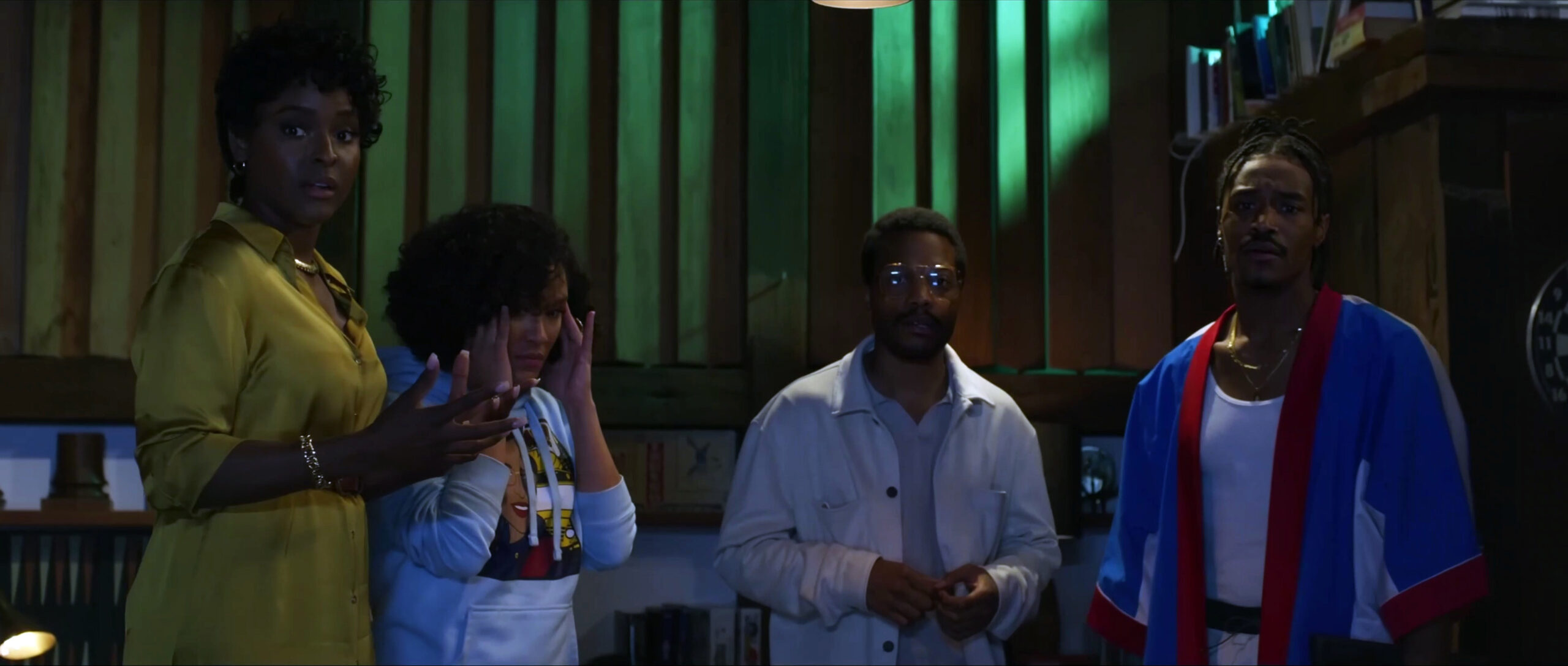Even by the 1990s I knew how condescending and racist it was that the black character would die first in every horror movie. Hollywood is long overdue for a correction and critique by the African-American community in many ways, and in a classy movie we get a delightful skewering response from Tim Story and his cast. The Blackening picks those old tropes as its target, but goes a level above just a Scary Movie takedown of horror cliches for something that can be as interesting as it is funny.
Let me know if you’ve heard this story before: a few friends go to a cabin in the woods for a holiday weekend of sex, drugs, and fun times….only to find out their cabin is stalked by malevolent forces. There’s literally a movie called The Cabin in the Woods! But in the Blackening, the holiday is Juneteenth and the participants are all African American. Morgan (Yvonne Orji) and Sean (Jay Pharoah) are married, Lisa (Antoinette Robertson) and Nnamdi (Sinqua Walls) are secretly back together to the chagrin of Lisa’s bff, Dewayne (Dewayne Perkins). Rounding out the group are the smart Allison (Grace Byers), the reformed King (Melvin Gregg), the partier Shanika (X Mayo) and the meek Clifton (Jermaine Fowler), all reuniting after college in a long while.
As someone who aspires to be ally like Officer White (perfect name, played by Diedrich Bader), I went into The Blackening with an open heart, ready to laugh my ass off and learn something in the process. In both regards The Blackening succeeds. Tracy Oliver and Dewayne Perkins’s script mines all its best jokes from cultural specificity. The most insightful part of The Blackening is when all of these characters are confronted with the cliches of the horror movies they claim to despise. A lot of those cliches are cliches for a reason, and each character gets trapped in moments of hypocrisy as they attempt to break away from their past prisons. A great example: one character keeps getting asked if he has a gun, and goes to great lengths to show that he doesn’t have a gun and is a converted person, well equipped to defend himself and at peace. But when the house gets hella scary, the first thing he does is go get the gun he hid from everyone. There’s also a joke about Friends that is so funny my laugh went up 20 decibels. I also learned some things about African American culture I didn’t know: the biblical support of the iPhone, different meanings of the word bitch, and who to call in an emergency situation. All those “learning lessons” also contain excellent punch lines, as we sprint from one insightful joke to the next.
In horror comedy terms, the horror part of The Blackening is different. In a normal horror movie, the horrors come from jump scares or creepy imagery. Other than an admittedly pretty scary getup for the bad guys, I don’t believe I was ever really scared. That’s because the movie’s true horror comes from the phrase “every joke has a little bit of truth in it.” The twisted board game the group plays, for example, is so offensively racist you are laughing…but know that some people still see African-Americans like the game depicts them. When things get really bad, it’s equally funny and sad to realize each black character is willing to sell the others out for their own survival instead of sticking together. And maybe saddest of all: these age old tropes might be here stay because everyone thinks it might actually be the real truth. Bummer. Those are The Blackening’s horrors, and they hit more personally that any BOO!!! moment ever could.
But hey, at least The Blackening can say yes the black character dies first…but some of the black characters live to the end too! So…progress I guess? At least The Blackening gives me hope that we give African-Americans way more of a say in how they are depicted in movies today. Let’s invent some new cliches we can upend later!

